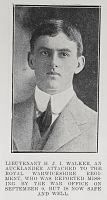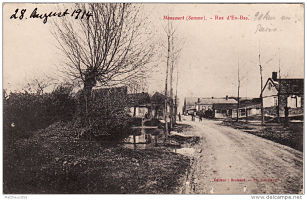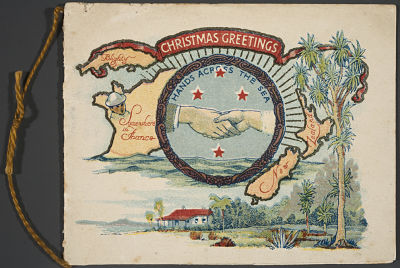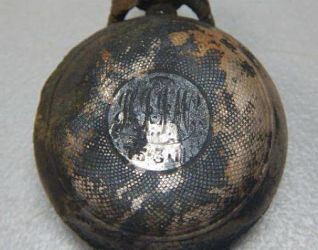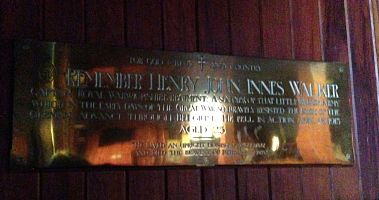WW1 Henry John Innes Walker
More than a century after his death on the Western Front in WW1, the remains of Henry John Innes Walker have been found and identified.
The area, in the West Flanders Langemark, was the site of the Second Battle of Ypres. Walker, a Remuera Aucklander who had joined the British Army and rose to become a captain with the Royal Warwickshire Regiment’s 1st Battalion. He had a distinguished career as an athlete and soldier.
Jack Walker, as he was known, was born on 12 Feb 1890, the eldest son of Henry (1859-1918) and Cecilia Walker (nee Taylor 1868-1942) of ‘Glen Innes’, Victoria Avenue, Remuera. He attended King’s College in Remuera from 1899 to 1909 and St Aidan’s Church in Remuera. He was prominent on the rugby field in the college’s first fifteen and represented Auckland in interprovincial football and in local athletics. He held the senior athletic championship when only 16 years of age. He left the college in 1909, continuing his studies for his army entrance examination under the guidance of his King’s tutors. In 1910 he was given a second lieutenant’s commission in the N Z Defence Force and in 1911 in the British Army, one of two colonial candidates to be made Second Lieutenant. (1)
Almost immediately he left England for India to join the Royal Warwickshire Regiment. During the 15 months he spent in India he took a prominent part in sports gatherings, representing his district at rugby and carrying off the 120 yds hurdles amateur championship for India. When the Warwickshires were ordered back to England, Jack Walker, who had qualified for his commission as a first lieutenant, but who was still a junior subaltern, accompanied them. After arrival in England he secured promotion to a senior lieutenancy. (2) (3)
His prowess on the rugby field was affirmed by playing in the senior team of the famous independent Blackheath Club as three-quarter back and securing representative honours in the Kent fifteen. At the army sports in 1913 he won no fewer than six cups. As a hockey player he took first in the final for the army champions. It was mainly due to his powers as a sprinter and hurdler that the Warwickshire won the regimental championship in the Eastern Command sports last year, since, of their total of 12 points, he scored 9 ¾. Jack Walker not only played for the Blackheath Club, at the Army Athletic Meeting, held at Queen’s Avenue, Aldershot, he won the 100 yds officers’ championship in 10 2/5 s, the 120 yds open hurdles in 16 4/5s, and ran third in the 100 yds open championship. (4)
After war was declared in August 1914 the Warwickshires, who were at Hythe, left for the front on 20th August. The regiment arrived in France on August 23, and a few days later the young New Zealander saw active service on the Belgian frontier as part of the Fourth Army Division.
Several letters from Jack detailing his actions were published in the N Z Herald from time to time. On September 9 1914 a message was received in Auckland from the War Office to the effect that Lieutenant Walker was missing. Within the next few days, however, word was received that he was safe and well. He had been separated for a few days from his regiment in a battle, of which he gave the following account:
LIEUT. WALKER’S SAFETY AT THE FRONT AND UNHURT. BATTLE OF HANCOURT. INTERESTING EXPERIENCES.
The letters received by his relatives are dated October 10 and 15 respectively, and explain that he was at no time in the hands of the Germans, but was merely separated from his regiment for a day or two. ”At last I have an hour of rest and a chance to write,” the first letter remarks. “I will try to tell you what I can remember. Of course I was at Hythe when it all started. . . . The order came to mobilise, and for the next three days we were hard at it. Then we were rushed all over England which, I suppose, was a scheme to deceive the Germans. . . . Late one night we got instructions to embark. We had a smooth passage across, and I was able to enjoy the last decent meal I had for a long time. We arrived in France on August 23, and at 8.30 p.m. that day we entrained and travelled all night, getting to Le Pateau about 11 a.m. next day. Then we got off and marched to Beaumont. It was horribly hot, but the peasants were very much interested in us and gave us much food. That night we did a night march and got to (the name of the town is not decipherable in the letter) about 9 a.m. This was very near to the Belgian frontier.
At the Battle of Hancourt
“That morning we heard gun and rifle fire, and in the afternoon we lay in a field while the Seaforths, on our left, were shelled a bit, a couple being killed. The same evening a Uhlan patrol came into contact with our troops, and we ‘ scuppered ‘ them. About 11 p.m., we got up and retired, as the Germans were getting around our flank, and marched from then until eight o’clock next day. We were all absolutely ‘cooked,’ and when we halted lay down and slept for an hour. Suddenly, we were wakened by terrific gunfire—the battle of Hancourt had started. We heard that the King’s Own were being cut upon the other side of a ridge to our front, where the noise came from, so we rushed forward, and then we fairly took it ‘ hot and fast.’
Air Full of Bullets and Shrapnel
“When we got to the top of the ridge, we could see nothing, but, all the same, the air was full of bullets and shrapnel. Before this ‘ scrap smarted most of us had never been under fire, but in five minutes we had all experienced just about every sort of bullet from every sort of gun. Of course, it was useless to stay there on the ridge, so we retired to our original position, and lay there all day, while a terrible artillery duel went on. The Germans tried to attack once, but our guns absolutely swept them off the face of the earth. The German guns tried to put our guns out of action, to stop our gun-fire on the German infantry, which was in massed formation. The German casualties were enormous, but it was no use, because, for every man we knocked out, they sent up three or four, so again we had to leave. “During this battle our regiment got very scattered, but we were not disorganised. It was our (the British) hanging on in this position that upset the Germans. I left our trenches with the colonel and adjutant with about 300 men. We marched hard all night and eventually got into a block of transports. I went on to see what was doing, and while I was away the others left, so then I had to fend for myself. I was very lucky and met a major of a heavy gun brigade, who gave me a ‘feed.’ I then went to look for the regiment, but could not find it, so I went back to the gunners, who gave me a ride on their guns. We travelled all night, but I don’t know to this day where we went. “
Back to Compiegne
“Next morning; that is to say August 27, at about 8 a.m., we met a lot of troops making their way to St. Quentin. I slipped off the gun and gathered up about 50 of our stragglers and brought them along. When we got to St. Quentin we were told to move on to Ham. We did that, and then we were all bundled into a train and sent back to Compiegne. Here we were put into a rest camp, where we had a rest and some good food. Lots of our men continued to roll up, and eventually we had about 700 men, and nearly all of the officers, with us. We were then, trained back to Rouen, all without a sop until the morning, when we went into French barracks, where we had a week’s rest and were refitted out as far as possible. Then we started off for the front again and followed up the retreating Germans, and you may guess it was a relief to be advancing and not retiring.
Little ‘Scraps’ Every Day
“We had little ‘scraps’ every day in our part of the line. The Germans ‘went for it,’ .and our advance, as of course you know, was not checked much. We crossed over the Aisne about three weeks ago, and since then nothing much has happened to our party. The harder the work and the less the food the better and fitter I have been, and now I am ‘awfully’ well and fit. I have had my share of narrow shaves, but then who has not. . . I was reported missing in some of the English papers, but it was untrue.” Damage Done by Germans The second letter from Lieutenant Walker is dated October 15. “I am well and fit,” says the writer. “In the first part of the war we used to sleep outside, but now, as the weather is colder, we go into ‘billets.’ I am billeting officer for the regiment, and have to go into the houses and see what the Germans have done. I cannot describe how they have knocked the places about. One really feels that nothing could ever be done to punish them sufficiently for it. Well I must stop now as we have to push on after these ‘blighters.’ (5)
Letters in December 1914 from Jack Walker to his parents in Remuera, tell a rare tale of life in the trenches: “I have just time to drop you a line before we go into the trenches. We came back from our old one after 32 days in them, and we have three days’ rest, so that we are now nice and clean again. Officers, N.C.O.’s, and men are bathed, in clean clothes, and all as fit as fiddles. The ground is frozen six inches deep, and the snow covers everything to a depth of about two inches. Yet I’m as fit, as fat, and well as I can be, and I’m even beginning to get a colour. I’ve been commanding my company now for over a month.”
Lieut. Walker again writes: “I haven’t deserted. I’m not even wounded. All officers who have been out all the time have been given ten days’ leave to England, two being away at a time. I’m second senior of that lot, so here I am. I left the trenches about midnight on the night of December 1, got a horse, rode to divisional headquarters, got in a London motor-bus, motored from Nieppe, near Armentin, to Boulogne, got there at 2 a.m. on the 2nd, caught the packet at 3 a.m., crossed safely, and arrived here (England) at 8 p.m. —that is, from the trenches to peace and perfect cleanliness in less than 24 hours.”
On December 10 he wrote: “I’m doing my share of the work in the western corner of Belgium. Although I’ve had, like all the others, a pretty strenuous time, yet-the harder it is the more I thrive. I have not felt sick or sorry since the war began. It would take hours to tell you what I have been through. I’m now in charge of a company of 200 men, and have 350 yards of trenches to hold at any cost. There are hundreds of others at the same job, and as long as I can hang on to mine, outside news does not matter much. I only know that Army Headquarters Staff profess to be entirely satisfied with the situation, and say it is only a question of time before the Germans throw in.” Under date December 14, Jack Walker wrote: “The men have just come back from trenches, and have I had an awful time. They had to evacuate parts of the trenches, as they were full of water, and the remaining trenches had six inches to a foot of water in them. It rained all most incessantly. But the wonderful thing is that the men are all well and fit, and very few have colds. They are very cheery about it all.” (6)
Advice was received on January 22nd 1915 that Lieutenant Walker had been promoted to the rank of captain. His name was mentioned in despatches the following month for “gallant and distinguished service in the field.” (7) And again in May 1915 from Field-Marshal French, Commanding-in-Chief of the British army in the Field for gallantry and distinguished service. (8)
The NZ Herald in March 1915 reported that Captain Walker gave an amusing account of a successful attempt to render the trenches more comfortable.
Fun in the trenches
“Not much news to-day,” he writes. “Just as much rain as ever and the trenches full of slimy mud, but to-day for the first time for weeks we have had the sun out, and it is topping. ”As a portion of our trench had about 2ft of water in it, we set up the rummiest pump you have ever seen,” the letter continues. “It was about 12ft high, and had long spidery legs, and looked more like an armour-plated grasshopper than anything else. First of all we could not get the thing into the trench at all, but an energetic Tommy, with great zeal, fitted it in. Then Lieutenant, who thinks he is a bit of a nut at engineering, got to work to mount it. He put sandbags on the bottom of the trench to stand on, and, after much language from him and his muddy assistants, and much screwing and hammering, pronounced the engine ready. It had a handle for two to work, so Lieutenant balanced himself on the end sandbags and told his worthy platoon sergeant to go and do likewise. Then he, seized the handle, and with great zeal, started to work it backwards and forwards. The poor sergeant was not quite ready, and was groping in the dark for the handle, when all of a sudden he got it—right in the chest. With a loud yell he fell backwards into the water and disappeared. After a few minutes’ search he was dragged out and put on one side. Then another fellow took his place, and the operation was repeated with the same result, but this time the lieutenant caught it and was nearly drowned.” A third attempt was made with more success. “But by this time, the pump had caught cold and made an awful noise.”
Captain Walker continued. “It rumbled and growled and coughed and groaned. It was a pitch-black night and very cold. The German, 75 yards away, heard these weird and awful rows, and sent over numbers of star shells, but they could not see anything. Then they started to shoot. Three machine guns and many rifles hurled ‘ nickel birds’ at our trench with no result-still these awful rumbles, still more fire. The Germans apparently thought that some awful engine of war was being brought up against them. Then the pumpers could stick it no longer. They sat down in the mud and laughed, and the whole company laughed with them. The Germans seemed to realise they had been fooled and slowly ceased firing. Having pulled ourselves together we got to work again and pumped hard, but we noticed that the water did not decrease. Our dismay was pitiful to hear. A search was organised to find the trouble. Lieutenant in his hurry to get to work, had thrown the bulk of the hose over the parapet, but had left the end in the trench, so the water had been doing a round trip at our expense. Again more pitiful exclamations. We eventually got the trench dry and lived in it happily ever afterwards. … It is little incidents like this that amuse us and brighten up our days in the trenches.” (9)
THE CHRISTMAS TRUCE. PEACE IN THE TRENCHES. LIEUT. WALKER’S ACCOUNT. EXTRAORDINARY INCIDENTS. FOUR DAYS – LULL IN FIGHTING.
Christmas 1914 saw a truce observed by the British and German troops on Christmas Day. Lieutenant Walker described what happened beforehand in a letter to his mother:
“I am going to spend this Christmas in the trenches,” he wrote. “We have two turkeys, a ham, some mince pies, eight plum puddings, and sweets and chocolates galore —so I shall not be hungry, even if I am anything else. I hope you people had a good time, because really I am, in a way enjoying myself. It is pretty cold, and very wet, but I have warm clothes and good food, and I have never been so it before. It is, of course, dull work in the trenches, but it has to be gone through with. We have a day in Brigade Reserve, then four in the front trenches, then one in Brigade Reserve again, and then two days’ complete rest right out of range of all guns —we can only just hear them. During our two days’ rest, we have our bath and change our clothes and clean up generally. During our stay in the trenches, we cannot get more than a lick and a promise for a wash, so we get a bit grubby towards the end of the four days. “The Christmas presents for the regiment are enormous, ‘ Lieut. Walker continued. ” I have, of course, only had a few but the others have had such a lot that I have done very well, in fact, too well and am now a bit short-tempered when ‘annoyed. The men have had so many things sent them that they cannot carry them all.”
Germans Propose “Local Peace.
“I suppose I have spent the most unique Christmas that I ever shall spend or want to spend.” Lieut. Walker wrote in a letter dated December 26. “On marching up to relieve the Dublins on Christmas Eve, we noticed that there was little or no firing going on. When, we got there, they said the Germans wanted to have a local peace, being Christmas Eve. When we had taken over and got everything straight, we answered the enemy who were shouting at us from their trenches 8 yards away. They said they would not fire if we did not. We were a bit suspicious at first, but at last we agreed loud cheers from the Germans. To show they meant what they said, they put lights along the tops of their trenches so that we could see their movements. Then they asked our men to go across— but again we smelt a rat, but two of our men slipped across actually into the German trenches and were taken before an officer. He asked them what they were doing there; they said they had been invited over. He was rather a sportsman, gave them a couple of cigars each said they had more pluck than sense and sent them back to tell us we would be friends for 24 hours.
Cheers for the King.
“Of course through the night we were very, very careful in case of surprise, but nothing happened. During the night, the men grouped together round the fires and sang carols, hymns and very ‘low’ funny songs almost in the same breath. The Germans from their trenches applauded our singing, and we did the same for them. They sing very well, and have better taste than our men in the class of songs. At midnight I hopped on to the top of the trench and called for three cheers for the King, and then we sang the National Anthem. I’m blowed if the Germans didn’t join in. I turned in about 1 a.m., and they were still at it. Next morning the most farcical affair took place. Our men and the Germans met half-way between the trenches, shook hands, exchanged cigars and cigarettes, and talked matters over. The Germans in front of us belong to the (four) Saxon corps. They are either absolute kids (some owned up to being 16 ½ years old) or else funny, fat, old things. They gave us photos of themselves and we gave them bully beef, jam, etc., which they were mighty pleased to get.
Events of Christmas Day.
“Many funny things happened. One of our sergeants, a great burly fellow and a real good sort—saw quite a kid walking about. He looked at him and dived into his dug-out and produced a stick of chocolate and gave it to the boy, who was delighted. Later on someone must have been doing a bit of shooting in the wood just behind us and fired his rifle. It almost caused a panic, but when I explained matters they quieted down. Most of them can talk English fairly well. During the morning they had an impromptu soccer match, England v. Germany, with an old cap, which ended in one of the Germans being pushed into their own barbwire entanglements and getting rather cut about. About 4 p.m. I was in our trench having tea, in fact we were all back in our trenches with sentries posted, when I heard a shout. ‘Muster Walker, vill you spare me a moment? I looked over the trench and saw a German officer about 60 yards away — I suppose the men had told him my name. He wanted to know when ‘peace’ was to be over. I said we did not care, so he suggested 4.30 to-day (26th), as they had a holiday up to then. At 4.30 p.m., we were all well down, but nothing happened, and not a round has been fired for the last 48 hours. It is absolutely absurd to my mind. This morning we were told that our guns were going to shell the Germans, so we got back into our trenches, and so did the Germans. When the shelling was over, they came out and told us how they had got on, etc. Isn’t it ridiculous? Things have gone on the same for all four days we were in the trenches last night, the Germans sent a message to the regiment on our right and asked them to get well under cover as the(the Germans) wanted to tune up a machine gun. When they had finished, they let the Rifles know, and thanked them for getting out of the way. Both sides have taken advantage of the lull to dig new trenches, put up wire entanglements, etc., which could not have been done if firing had been going on. We are so dug in and wired in now that neither side can advance from their own trenches even if they want to.” (10)
On the 30 April 1915 the NZ Herald reported that Captain Walker, aged 25, had been killed in action on the 25th April 1915. The text of the telegram to his parents from the Secretary of State for War said “Deeply regret Captain Walker, 1st Royal Warwickshire Regiment, killed in action April 25, Lord Kitchener expresses sympathy.”
Discovery of Henry’s remains
Archaeologists working on a dig in a Flanders field uncovered 45 fallen soldiers. Objects found with Jack Walker’s body include a medallion, whistle and a pair of binoculars. Along with bone material analysis and the examination of historical sources, the possessions helped archaeologists to conclude that the remains could only belong to Walker. He was shot in the stomach at about 3.30am as his company advanced to take a defended wooded area. Official UK war documents from the time state that Walker’s body was last seen lying in a large shell crater, about 45m from a German trench. Comrades of Walker believed that the enemy would “probably” have buried him in the “natural grave” of the shell crater. The NZ Herald reported him killed at St. Julien north of Hill 60 during the battle for Ypres. (11)
Walker’s death was witnessed by a Private Brown. His statement reads: The battalion had been in trenches and had gone for a rest in billets at Bailleul, but on Friday April 23rd came the order to pack up and be ready to start in ½ hour. They went toward Ypres and billeted there that night. On Saturday 24th April, they slept out in a field and about 5.30am moved off, being instructed to find exactly where the German position was. Suddenly in the dark, the Germans opened a heavy fire on them from not more than 200 yds… Indian troops had been driven out of some trenches inn a wood and that the Germans had occupied these trenches. Pte Brown was wounded and saw not many yards off, Capt. Walker, with his revolver in his hand, calling on the men to follow him against the Germans, and saw him fall. Rouen 8th May 1915. (12)
The medallion with the initials HJIW
His remains have just been uncovered as part of a dig forming a TV series, In War Special: Among Flemish Fields, Belgian news outlet HLN reports. As Walker, like many commissioned New Zealand officers, was serving in the British Army, it is understood that the recovery, identification and re-interment of the remains is the responsibility of the British authorities. (13)
Henry John Innes Walker is remembered at the Ypres (Menin Gate) Memorial in West-Vlaanderen, Belgium and at Auckland War Memorial Museum’s World War I Hall of Memories and Online Cenotaph.
He is also commemorated at:
• King’s College, Otahuhu, Auckland in the stained glass windows of the Chapel which was consecrated on Anzac Day 1925, 10 years after Henry John Innes Walker’s death.
• St Aidan’s Church, Remuera on the Memorial Cross and on a brass plaque inside the church.
Jack Walker received the 1914 (Mons) Star with clasp which was awarded to men who actually served under the fire of the enemy in France and Belgium between the 5th August, 1914, and midnight 22nd-23rd November, 1914. (14)
Jack Walker’s story was told on TVNZ Channel One on the Sunday programme on 9th October 2016:
http://tvnz.co.nz/sunday-news/in-flanders-fields-video-6496174 (This link has now disappeared as at 15 April 2018).
From the history of The Queen’s Division – Captain Henry John Innes Walker of The Royal Warwickshire Regiment
https://www.youtube.com/watch?v=La_mGgaNQyc
Also on Lives of the First World War
https://livesofthefirstworldwar.org/lifestory/7186019
Jack Walker was mentioned in his father’s obituary:
OBITUARY MR H. C H. WALKER
Mr. Henry Charles Holden Walker an old resident of Auckland whose home was at Victoria Avenue, Remuera died at a private hospital yesterday, following an operation. The deceased, who was 59 years of age, came to New Zealand from Kent about forty years ago, and entered the employment of Messrs. Archibald Clark and Sons. Ten years later he was placed in charge of the Manchester and dress department, a position he held until his death. Mr. Walker was prominently associated for some years with the Reform League, being a member of the executive. He was also a member of the board of trustees of the Blind Institute for about twelve years and for a portion of that time was chairman of the board. In his younger days Mr. Walker was an ardent yachtsman, and was a member of the original crew of the yacht Volunteer. In recent years he took a keen interest in King’s College. There his four sons were educated. He is survived by Mrs. Walker and three sons. The eldest son Captain H. J. I. Walker was killed at the second Battle of Ypres. He was attached to the Royal Warwickshire Regiment, and went to France with the first British Expeditionary Force. The second son, Major Alan Walker went to Samoa with the first expedition, and later left tor France with the First Battalion, Rifle Brigade. He was recently invalided home. The third son, Corporal Charles Walker, is at present in camp with the forty-fifth reinforcement, while the fourth son is still attending King’s College. [15]
Update: A burial service has been held on 19 April 2018 at the Commonwealth War Graves Commission’s New Irish Farm Cemetery in Belgium for Captain Henry John Innes Walker, Royal Warwickshire Regiment and six unknown soldiers of the First World War.
The service was attended by members of Capt Walker’s family, who he is known to as Jack, including his great nephews, Allan and Alistair Innes-Walker, who travelled from New Zealand and Australia respectively.
